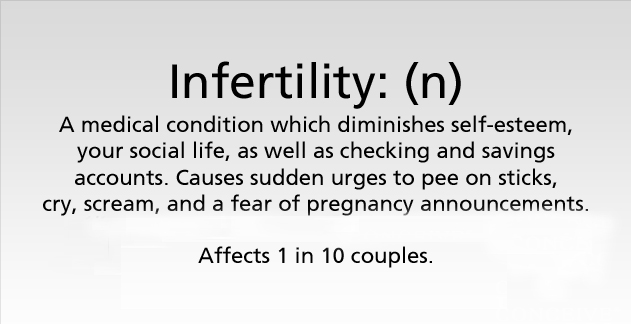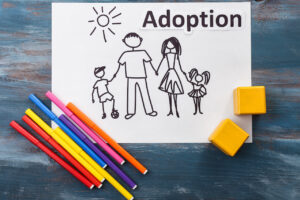Is infertility a disease ?

Cheers, dear readers,
Cathy here with the next installment of our infertility story. To make sure I state this at least once: We know that our story is simply ONE couple’s journey, and there are so many, unfortunately untold stories out there of many, many other couples. We offer ours as a way to be one voice out there to help shed light on the topic of the disease of infertility (and how it affects us physically, mentally and emotionally)…
Yes, you read that right – the DISEASE of infertility. I realized as I wrote that word that possibly many people – even those who suffer from infertility – may not believe or even LIKE that what they are experiencing is in fact a disease. So let’s take a look…
The definition of disease is: any deviation from or interruption of the normal structure or function of any body part, organ, or system that is manifested by a characteristic of symptoms and signs and whose etiology, pathology, and prognosis may be known or unknown.
By this definition, there is no question that infertility is an interruption / abnormality of the normal and healthy functioning of the reproductive system (one of the seven major organs of the human body), and therefore a disease. I’m sorry to break it to you, folks. None of us like to think of ourselves as diseased, broken or otherwise, not healthy. Citizens struggling with infertility walk around and go through life as others, but if they desire their own children, they are fighting a battle – one that they did not choose. That said, not everyone who is infertile suffers due to it. For example, some people do not want children, so they do not suffer the way others do who long for a biological child of their own. One could argue that wanting a biological child is not a medical issue, and one can live life without a child. Since when, however is someone else’s perception of how detrimental a physical problem is a deciding factor in whether we classify something as a disease (which has complications and trauma as a result of being so)? And let’s not forget that infertility affects someone not just physically, but emotionally and financially too. It IS a disease, and one that does not get a lot of publicity as being such. I personally think that when anyone says it is not a disease, they are minimizing the pain someone who has the condition is under (or has been under in the past). And to me, that is just cruel. And alternately, saying infertility IS a disease is not an insult, anymore than saying “cancer and diabetes are diseases” is an insult. No one is blaming (or should be blaming) the sufferers (but it is indeed, still a disease). Yet in a lot of our society, people treat infertility as something to be ashamed of, something not to speak of in polite company. Let’s hide it under the carpet, and try to treat it quietly and never speak of the trauma that our friends and family have gone through to finally have their biological child (or not, if treatment is not successful!). IVF doesn’t really treat the cause of the infertility – it helps you skip some of the most tricky early steps of the reproductive process, if one needs to, to hopefully conceive.
And that’s exactly where we left off. Eric and I were scheduled to embark on a very scary journey… the unknown world of fertility treatment. And boy was it expensive. Don’t get me started right now on why health insurance either does not cover it AT ALL or only covers parts of fertility treatment that, from what I can tell, may not be very effective, depending on the couple’s particular issue (why does the insurance company get to choose?). That will be for a future post. Eric and I are not wealthy. We do not have celebrity bank accounts. We are just a man and a woman who wanted to start our own family, who wanted to give our parents grandchildren and carry on our family line. If Eric and I were unsuccessful at having our own children, we were VERY well aware, the “buck stopped with us”. Both of our fathers lines would cease to exist. Literally… I am not being dramatic. Eric’s father only has one child: Eric. And my father had two girls, and my sister CHOSE to not have children. That thought haunted me as we went through this process. It made me wake up in the middle of the night in a cold sweat. On some days, it almost gave me a panic attack. How could this happen to us? Who else had to suffer through this? We had no idea. All of our friends and family either had children easily (that we were aware of) or decided to go through life “child free”, such as my sister. As I write this post, I am crying… crying for my unborn children that I will never meet… crying for my father for whom one of his last wishes before he began to perish from cancer was that Eric and I would give him grandchildren… carry on his line. How do we live with ourselves when that does not happen? How do we go on, and with a positive attitude? And why is there so little recognition for the emotional anguish that our infertile brothers and sisters go though… unacknowledged, unheard, unhealed. Suffer in silence. Bite your lip. Put on a brave face. Smile… while you are grieving what you don’t even know how to grieve. No one taught us how to deal with this.
If I can leave you with anything with this post – it is that infertility IS a disease. It is a disease that needs to be treated. And those who suffer from it need to be supported, and need to be heard. If you feel like no one is listening, please know that you can come here. We are listening to you.
Please join me next week to hear more about my personal journey down the infertility path. I look forward to speaking with you. And I wish you the best on your journey.
Warm regards,
Cathy




Cath – another beautifully written piece giving us all just a brief glimpse of what you and Eric experienced. Thank you for sharing and opening up yourselves this way. You are so strong and brave to do so.
Love you lots, GND 🙂 xoxoxo